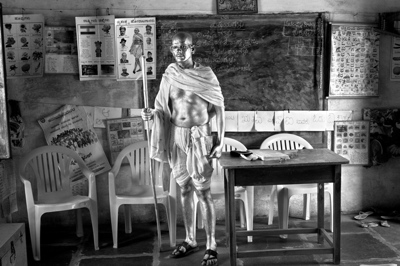Gandhi on Nonviolence in Action and Education
by Purushottama Bilimoria

Indian actor Bagadehalli Basavaraju poses in classrooms as living statue of Gandhi; courtesy thebetterindia.com
Mohandas Karamchand [Mahatma] Gandhi adopted the metaphysics of a broadly-conceived Hindu religious thought for his social critique, out of which he developed a distinctive educational philosophy, which gave particular emphasis to truth and nonviolence, or the teaching of peace. In his social thinking he gave immense importance to what he called a ‘balanced’ form of education. By this he meant balanced as to needs, i.e. the necessities of life, against wants, i.e. whatever one yearns to possess, acquire or enjoy out of desire; and, more significantly, balanced as to internal values against a disproportionate concern with the externals (1948: 52). By ‘externals’ is meant the goods people generate and the sorts of activities, planning and manoeuvres people carry out in the normal course of living in order to meet the demands of commerce, material accessories, personal welfare and reproduction, and which are at the same time instrumental in sustaining the community.
Indeed, how could Gandhi underestimate the importance of this aspect of life, particularly in a country that was struggling to survive, to provide food, clothing, shelter and protection to its people, especially in the aftermath of the enormous exploitation of the country’s resources and labour under the colonial regime over the past few centuries? There is no denying the fact that Gandhi’s philosophy embraced a definite project for social and economic development of the nation. This included the production of useful material goods, in the absence of which, Gandhi believed, people would continue to be deprived of the elemental necessities of life and be subjected to control by forces external to themselves, or the ‘market forces’, such as competition, massive industrialization, commercial monopoly and international enterprise, all of which, in his view, easily become vehicles for exploiting others. (1931b: 224; 1948: 40, 77)
Read the pdf of the complete article here: Gandhi on Nonviolence in Action and Education
EDITOR’S NOTE: Purushottama Bilimoria is Honorary Associate Professor, faculty of Arts and Education at Deakin University in Melbourne Australia. His university web page gives a list of his publications, and other relevant information and links.




